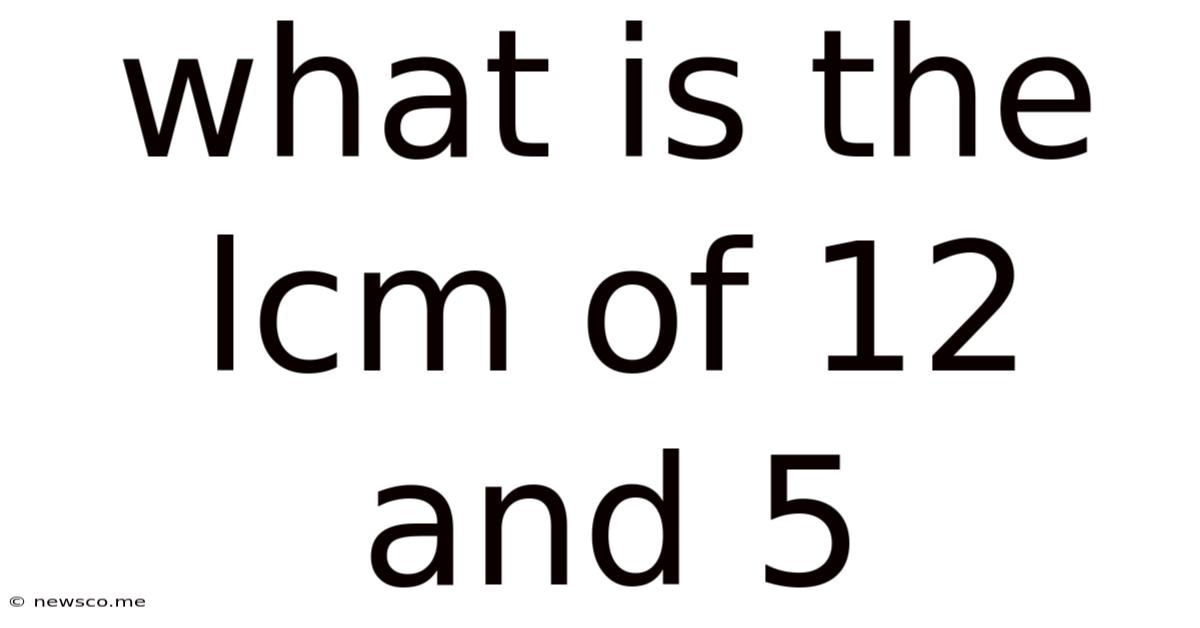What Is The Lcm Of 12 And 5
News Co
Mar 23, 2025 · 5 min read

Table of Contents
What is the LCM of 12 and 5? A Deep Dive into Least Common Multiples
Finding the least common multiple (LCM) of two numbers is a fundamental concept in mathematics with widespread applications in various fields. This article will not only answer the question "What is the LCM of 12 and 5?" but also provide a comprehensive understanding of LCM, different methods for calculating it, and its practical significance.
Understanding Least Common Multiples (LCM)
The least common multiple (LCM) of two or more integers is the smallest positive integer that is divisible by all the integers. It's a crucial concept in simplifying fractions, solving problems involving ratios and proportions, and understanding rhythmic patterns in music, among other applications.
Let's break down the key terms:
- Multiple: A multiple of a number is the result of multiplying that number by any integer. For example, multiples of 3 are 3, 6, 9, 12, 15, and so on.
- Common Multiple: A common multiple of two or more numbers is a number that is a multiple of all of them. For instance, common multiples of 2 and 3 include 6, 12, 18, 24, and so on.
- Least Common Multiple (LCM): The smallest of these common multiples is the least common multiple. In the case of 2 and 3, the LCM is 6.
Calculating the LCM of 12 and 5
Now, let's address the specific question: What is the LCM of 12 and 5?
There are several methods to find the LCM of two numbers. We'll explore the most common ones, applying them to 12 and 5:
Method 1: Listing Multiples
This is a straightforward method, especially suitable for smaller numbers. We list the multiples of each number until we find the smallest common multiple.
Multiples of 12: 12, 24, 36, 48, 60, 72, 84, 96, 108, 120... Multiples of 5: 5, 10, 15, 20, 25, 30, 35, 40, 45, 50, 55, 60, ...
By comparing the lists, we see that the smallest common multiple is 60. Therefore, the LCM of 12 and 5 is 60.
Method 2: Prime Factorization
This method is more efficient for larger numbers. It involves finding the prime factorization of each number and then constructing the LCM using the highest powers of all prime factors present.
- Prime Factorization of 12: 2² x 3
- Prime Factorization of 5: 5
To find the LCM, we take the highest power of each prime factor present in either factorization:
LCM(12, 5) = 2² x 3 x 5 = 4 x 3 x 5 = 60
Method 3: Using the Formula (LCM and GCD Relationship)
The least common multiple (LCM) and the greatest common divisor (GCD) of two numbers are related by the following formula:
LCM(a, b) x GCD(a, b) = a x b
Where 'a' and 'b' are the two numbers.
First, let's find the GCD of 12 and 5 using the Euclidean algorithm:
12 = 5 x 2 + 2 5 = 2 x 2 + 1 2 = 1 x 2 + 0
The GCD is the last non-zero remainder, which is 1.
Now, we can use the formula:
LCM(12, 5) x GCD(12, 5) = 12 x 5 LCM(12, 5) x 1 = 60 LCM(12, 5) = 60
Applications of LCM
The LCM finds applications in diverse areas:
1. Fraction Addition and Subtraction
To add or subtract fractions with different denominators, we need to find a common denominator, which is usually the LCM of the denominators.
For example, to add 1/12 + 1/5, the LCM of 12 and 5 is 60. We then rewrite the fractions with a denominator of 60:
(5/60) + (12/60) = 17/60
2. Scheduling and Time Problems
LCM is crucial in solving problems related to recurring events. For example, if bus A arrives every 12 minutes and bus B arrives every 5 minutes, the LCM (60 minutes) tells us when both buses will arrive at the same time again.
3. Music and Rhythms
In music, LCM helps determine the least common multiple of the rhythmic patterns, crucial for creating harmonious compositions and identifying rhythmic cycles.
4. Construction and Engineering
In construction and engineering projects, LCM helps coordinate tasks with different durations, ensuring efficient project completion.
5. Computer Science and Algorithms
LCM calculations are used in various algorithms, including those related to scheduling, resource allocation, and cryptography.
Advanced Concepts Related to LCM
While we've covered the basics, some advanced concepts further enhance our understanding:
1. LCM of More Than Two Numbers
The methods we've discussed can be extended to find the LCM of more than two numbers. For prime factorization, we consider all prime factors from all numbers involved. For the listing method, we list multiples of all the numbers until a common multiple is found.
2. LCM and GCD in Modular Arithmetic
LCM and GCD are essential concepts in modular arithmetic, which deals with remainders after division. They are used in various cryptographic algorithms and number theory problems.
Conclusion: The Importance of Understanding LCM
The LCM, though seemingly simple, is a fundamental mathematical concept with far-reaching applications. Understanding its calculation through different methods, as demonstrated with the example of finding the LCM of 12 and 5 (which is 60), empowers you to solve a wide array of problems across various disciplines. Whether you're simplifying fractions, scheduling tasks, or exploring rhythmic patterns, mastering the concept of LCM equips you with a valuable tool for mathematical problem-solving. Its significance extends beyond basic arithmetic, playing a vital role in more advanced mathematical fields and practical applications.
Latest Posts
Related Post
Thank you for visiting our website which covers about What Is The Lcm Of 12 And 5 . We hope the information provided has been useful to you. Feel free to contact us if you have any questions or need further assistance. See you next time and don't miss to bookmark.